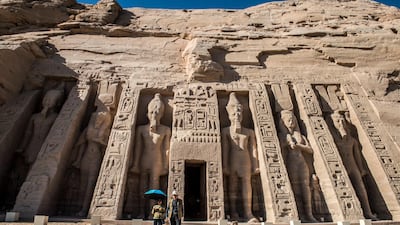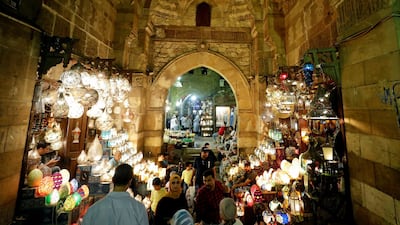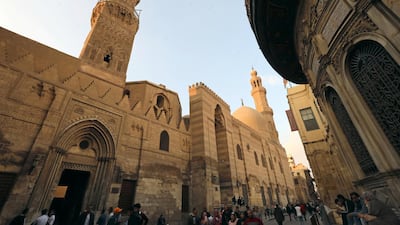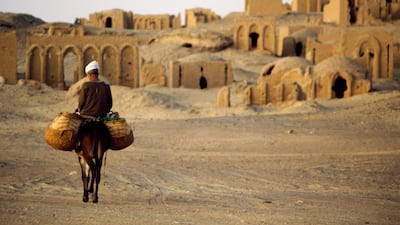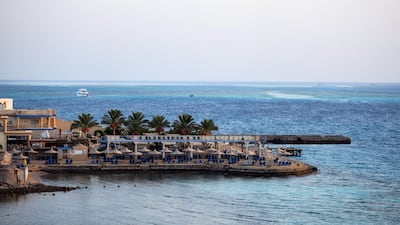Egypt wants at least one person in each household to work in tourism as part of wider plans to develop a resilient and sustainable sector through structural reforms that will boost its competitiveness globally.
The authorities' efforts are paying off: Tourism revenue jumped 28 per cent to a record $12.6 billion (Dh46.2bn) in the 2018/2019 fiscal year, beating the 2010 peak levels, as visitors stayed for longer and spent more, Rania Al Mashat, Egypt's tourism minister, said.
"We wanted to create a resilient sector. How do you create a resilient sector? You don’t just focus on the number of tourists, but you also focus on employment … because then everyone has a stake in making sure that it functions well," Dr Al Mashat said.
Tourism is a key pillar of Egypt's economy, providing 15 per cent of its gross domestic product, and a major source of hard currency and income for four million citizens. Egypt's tourism sector is on a sharp rebound after suffering from the 2011 uprising and a series of attacks that raised security concerns. With improving security and a reform agenda, visitors have returned. The UK in October lifted its travel restriction advisory against flying into the popular Red Sea resort town of Sharm Al Sheikh.
Egyptian authorities are developing new tourism offerings, upgrading accommodation standards and sharpening a global marketing campaign as part of the 'Egypt-Tourism Reform Program' (E-TRP) launched in November 2018.
The North African country's touristic appeal was never in doubt — with the lure of ancient pyramids, a third of the world's antiquities, world-class diving destinations and seven Unesco World Heritage sites — but it is also diversifying its offerings.
The Red Sea Mountain Trail, a 170-kilometre trekking route near the resort of Hurghada that was listed by Time magazine in the world's greatest places to visit in 2019, is one example, Dr Al Mashat said.
The much-anticipated opening of the $1 billion Grand Egyptian Museum (GEM) next year near the pyramids of Giza will be of "significant importance" to cultural tourism, she said. One of the largest museums in the world, GEM will house more than 100,000 artefacts, about 3,500 of which belong to the famous King Tutankhamun.
Its proximity to the new Sphinx International Airport means "you can combine a vacation where you do cultural tourism and see marvels of a 7,000 year [old] civilisation but at the same time you can go to the sea," Dr Al Mashat said. "There are many additional opportunities we’re creating to ensure more people are employed in the sector and that travellers' experience is unique."
Egypt is also working with the UN World Tourism Organisation to upgrade its hospitality criteria for the first time in more than a decade.
This means an overhaul of the hotel classification system in line with international standards and adding new types of accommodation such as eco-lodges, boutique hotels, safari lodges, heritage hotels and even sailing boats, Dr Al Mashat said.
The move will open new investment opportunities in the sector, create more jobs and cater to diverse requirements from tourists, she added.
"It's a win-win for everyone," the minister said. "Tourism is about people, places and policy."
Indeed, policy is at the heart of Egypt's Tourism Reform Program (E-TRP), a theme that Dr Al Mashat often cites to underscore the systematic approach for building a sustainable and resilient sector.
"The overarching objective of E-TRP is that we want at least one Egyptian from each household working in tourism," she said. "This is a goal which mobilises people around the sector, mobilises the stakeholders (98 per cent of the industry is run by the private sector) and creates buy-in when it comes to co-ordinating between different government agencies, because the objective of any government is to increase employment."
The government sees the private sector a key element of the reform agenda to introduce changes such as the hotel classification system, improving gender equality levels and introducing education curriculums related to tourism ethics.
Involving international partners such as the UN World Tourism Organisation and the World Travel and Tourism Council is also essential in communicating with the international community.
"All of these institutions are platforms where there's a lot of knowledge-sharing and they push the narrative on Egypt, on E-TRP, so it creates credibility with the international community, with tour operators and with airlines because we’re really changing the way we think about the sector," she said.
Egypt is looking to change the narrative about its tourism sector as it garners international recognition for its recovery.
Egypt ranked fourth for performance improvement on a 2019 tourism competitiveness index by the World Economic Forum (WEF). It also climbed the ranks in other categories including tourism brand strategy, cultural tourism, air transport infrastructure and price competitiveness.
Cairo was also recently named among the three best cities to visit in 2020 by Lonely Planet and Hurghada is expected to make the biggest leap up the rankings of the world's most popular city destinations in 2019. The city is forecast to take 63rd position after joining the top 100 in 82nd place last year, according to a November report by Euromonitor International.
“In North Africa, Egypt remains the leading destination following an active tourism reform strategy,” the Top 100 City Destinations report found. “Sharm Al Sheikh, Hurgada, Cairo, Alexandria and Luxor have all seen strong growth, with the return of visitors from the UK and Russia.”
Dr Al Mashat said: "We’re getting very good reviews, the narrative on the sector has changed, there’s international recognition of what’s going on".
Egypt was also awarded the WTTC Global Champions Award in April for the country's work on tourism resilience.
"There’s recognition of efforts undertaken by the Egyptian government on airports and infrastructure to ensure that the safety of citizens and visitors is taken care of," she said.
Egypt's travel and tourism continued growth throughout last year, making it the second-fastest growing in North Africa after Ethiopia, accelerating at 16.5 per cent, ahead of the global average of 3.9 per cent, according to the WTTC. Egypt expects double-digit growth in its tourism sector this year.
At the heart of Egypt's efforts to transform its tourism sector is the focus on people.
"Sustainable tourism today is about people and places: any traveller wants to go to a place and get to know its people, with their authentic food, authentic clothes, the handicrafts they produce, so our campaign is 'people to people', to show that Egyptians are people of peace, pride, positivity, passion," she said. "It’s people above politics."
Integrating locals from Sina to Siwa into the tourism sites means employing more people, empowering locals and offering tourists an authentic experience.
"Egypt is a very blessed country. In our marketing campaign we have branding by destination, so you have Magnificent Marsa Alam, Spectacular Sahl Hashish, Happening Hurghada, Capitvating Cairo, Charming Sharm Al Sheikh, Lovely Luxor, Amazing Aswan — all of these destinations means when you come once, you’d want to come again," she said.
Under the reform agenda, tourism is transformed into a project around which Egyptians can mobilise.
"The idea is that tourism becomes a national project where people are mobilised around making sure they feel included in it, not just as the income for their livelihood, but also for the GDP and growth of the economy."
Dr Al Mashat says every challenge along the way is an opportunity to accelerate further reforms.
"We know what the issues are, we are tackling them, we are changing the narrative on the sector. We have a different credibility now with tour operators, airlines and the international community, so all of this is positive," she said. "The pace of more reforms to come will be hopefully as fast as we want to see them."
